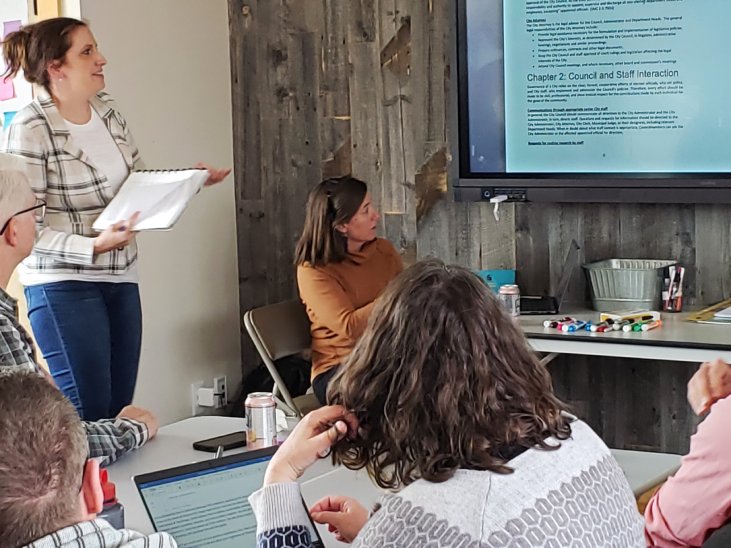As previously reported by Ark Valley Voice, on March 29, Salida elected officials and key staff met for an all-day retreat at the Hutchinson Ranch Visitor Center in Salida. While many people were observing the Easter weekend, off skiing, or attending numerous other events on Friday, City Council members were deeply engaged.
The annual session has been held at various sites for at least four years running, providing continuity in the process and format. Gathering city council priorities and input from staff helps to inform the the annual budget cycle, which kicks off in late spring. In addition, the 2024 retreat provided an opportunity to onboard new City Treasurer Ben Gilling as well as council members Aaron Stephens, Suzanne Fontana and newest member Wayles Martin, who was sworn in on Mar. 25.
Council’s Priorities

Salida City Attorney Nina Williams reviews the City Council Handbook. Post-It Notes at rear consider elements of “why are we here today?” Merrell Bergin photo
AVV dropped by the meeting as the mid-day break was finishing. Speaking with new council members Aaron Stephens, Wayles Martin, and Deputy City Clerk Sara Law, AVV heard a recap of the morning’s topics, beginning with a warm up and expectation-setting for the day.
Then, continuing with past practices, a review of council priorities and key projects helped get new members up to speed on what was accomplished in 2023.
Working from the 2024 Budget Overview, four categories of goals were reviewed: Fiscal Stability, Internal Operations/Communications, Stakeholder Engagement (External) Communications, and Community Infrastructure. Dividing into groups, the team evaluated past and proposed priorities for each.
“Yet community engagement seemed to overlap within each group,” council member Martin said. “Getting people to show up and participate is a key value.”
As well, the morning provided a chance to incorporate new council member perspectives and shifting needs in 2024. The economic realities of post-pandemic sales tax collection trends and planned debt service for the new fire station also were factors in discussions. A report-out on proposed new priorities for 2024 is expected to be released at a future date.
Accountability
Most organizations, whether for-profit, nonprofit, or governments/agencies (as well as individuals) set forth annual Action Plans. The purpose is to track progress towards goals and set new Key Performance Indicators (KPIs). Quantifying the number of calls for city first-responder services, response times on open records requests and overall constituent satisfaction are just a few KPIs that merit tracking. Street-miles overhauled, linear feet of sidewalks replaced, and ADA-improvement compliance are a few of the many others.
In addition to measuring staff and department performance, these KPIs can also be directly tied to future budget requests, justifying the felt priorities for programs as expressed by council members on behalf of their constituents. Going further, tools such as Performance-based budgeting (PBB) can also be used.
Well-established in major municipal and state governments, performance -based budgeting is fast overtaking traditional approaches of simply adjusting historical, line-item budgets for inflation. Instead, budgets can become forward-looking, dynamic, and goal-focused rather than just dollar-centric. As the City of Salida government continues to mature, these models (and others like it) may further enhance transparency and accountability, providing the return on investment for the services that constituents want and need.
Roles and Responsibilities
After the noon break, City Attorney Nina Williams led attendees through a review and markup of the City Council Handbook. As Law explained during the break, “information can always be presented better and more completely.” The goal of this session was to clarify council’s role versus city staff and attorney, regarding community and city operations. In addition, attendees aimed to uncover pitfalls, avoid unintended consequences and increase efficiency in doing the city’s business, including during council meetings.

Salida Mayor Dan Williams asks for feedback on reflective listening. From left, Bill Almquist, Dominique Naccarato, Michael Varnum, Dan Shore. Merrell Bergin photo
During a discussion about Salida’s tradition of “reflective listening” during council meetings for non-judicial matters, City Attorney Williams shared that no other municipalities in her practice has used this model.
In balancing the desire to show speakers “that they have been heard” against a need to not simply repeat what was said, it was felt by Mayor Shore, that perhaps the practice may have outlived its original purpose. Related to that was a desire to not open up public comment to become a “debate.”
At the same time, misstatements of fact sometimes creep into public comment that, up to now, may only be corrected during council member reports at the end of meetings.
City Administrator Christy Doon suggested a possible option in such cases might be to state: “your comment is taken under advisement and your question(s) will be directed to the appropriate department for follow up. If necessary…the City will correct the public record,” she added.
Doon said that in the case of something being “blatantly false”, to avoid it being quoted as “fact” in the media, the council could ask the Administrator or a department head to address it then and there. Setting clear expectations upfront with the public as to the accepted process for public comment is important, especially if any changes in past practice are implemented.
Opinions around the table were mixed on these ideas and no decisions were reached. It is likely that the process for public comment and addressing misinformation will continue to evolve as is happening in other municipalities.
According to information provided by the city, “the retreat is planned to end with a session that will seek to ‘reconnect the individual and collective ‘whys’ and next steps’ of the city’s planned agenda for the year.”
Featured image: Salida City Attorney Nina Williams explains council member and staff roles as 2024 retreat facilitator Jen Visitacion looks on. Merrell Bergin photo






Recent Comments